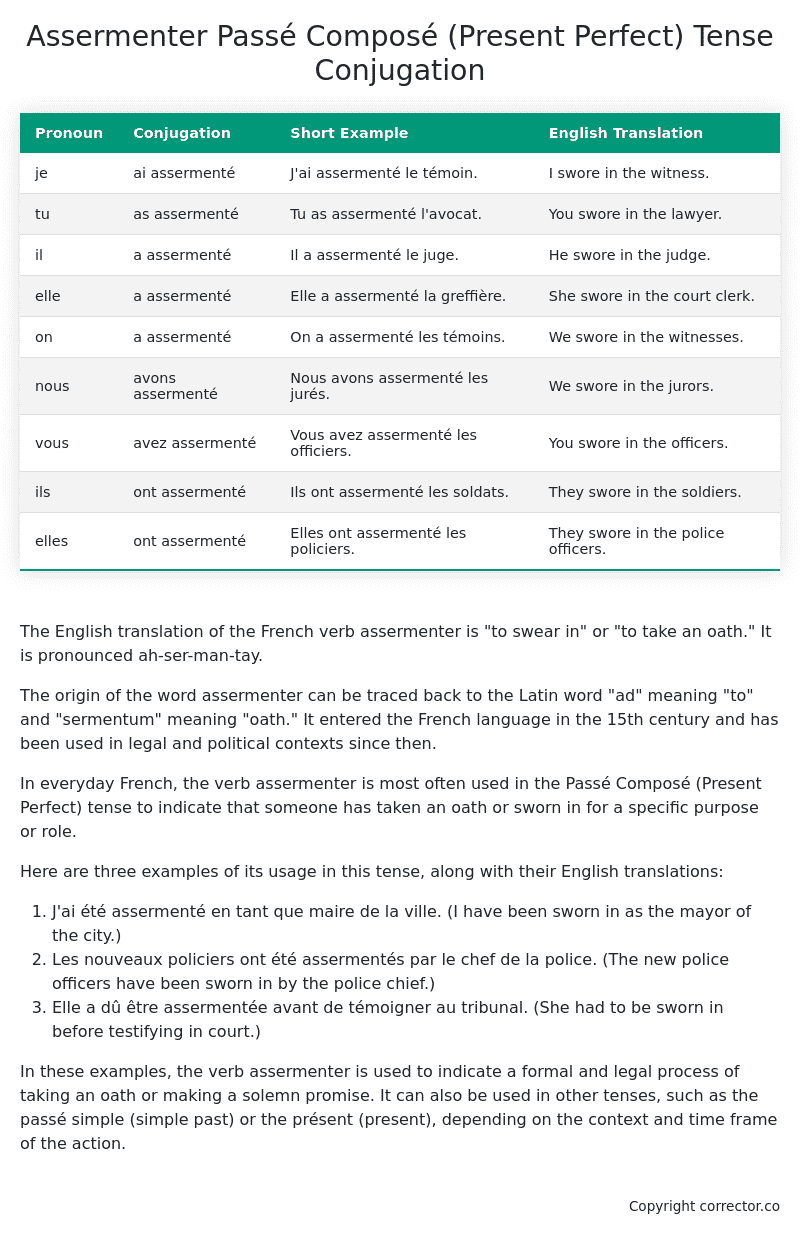Passé Composé (Present Perfect) Tense Conjugation of the French Verb assermenter
Introduction to the verb assermenter
The English translation of the French verb assermenter is “to swear in” or “to take an oath.” It is pronounced ah-ser-man-tay.
The origin of the word assermenter can be traced back to the Latin word “ad” meaning “to” and “sermentum” meaning “oath.” It entered the French language in the 15th century and has been used in legal and political contexts since then.
In everyday French, the verb assermenter is most often used in the Passé Composé (Present Perfect) tense to indicate that someone has taken an oath or sworn in for a specific purpose or role.
Here are three examples of its usage in this tense, along with their English translations:
- J’ai été assermenté en tant que maire de la ville. (I have been sworn in as the mayor of the city.)
- Les nouveaux policiers ont été assermentés par le chef de la police. (The new police officers have been sworn in by the police chief.)
- Elle a dû être assermentée avant de témoigner au tribunal. (She had to be sworn in before testifying in court.)
In these examples, the verb assermenter is used to indicate a formal and legal process of taking an oath or making a solemn promise. It can also be used in other tenses, such as the passé simple (simple past) or the présent (present), depending on the context and time frame of the action.
Table of the Passé Composé (Present Perfect) Tense Conjugation of assermenter
| Pronoun | Conjugation | Short Example | English Translation |
|---|---|---|---|
| je | ai assermenté | J’ai assermenté le témoin. | I swore in the witness. |
| tu | as assermenté | Tu as assermenté l’avocat. | You swore in the lawyer. |
| il | a assermenté | Il a assermenté le juge. | He swore in the judge. |
| elle | a assermenté | Elle a assermenté la greffière. | She swore in the court clerk. |
| on | a assermenté | On a assermenté les témoins. | We swore in the witnesses. |
| nous | avons assermenté | Nous avons assermenté les jurés. | We swore in the jurors. |
| vous | avez assermenté | Vous avez assermenté les officiers. | You swore in the officers. |
| ils | ont assermenté | Ils ont assermenté les soldats. | They swore in the soldiers. |
| elles | ont assermenté | Elles ont assermenté les policiers. | They swore in the police officers. |
Other Conjugations for Assermenter.
Le Present (Present Tense) Conjugation of the French Verb assermenter
Imparfait (Imperfect) Tense Conjugation of the French Verb assermenter
Passé Simple (Simple Past) Tense Conjugation of the French Verb assermenter
Passé Composé (Present Perfect) Tense Conjugation of the French Verb assermenter (this article)
Futur Simple (Simple Future) Tense Conjugation of the French Verb assermenter
Futur Proche (Near Future) Tense Conjugation of the French Verb assermenter
Plus-que-parfait (Pluperfect) Tense Conjugation of the French Verb assermenter
Passé Antérieur (Past Anterior) Tense Conjugation of the French Verb assermenter
Futur Antérieur (Future Anterior) Tense Conjugation of the French Verb assermenter
Subjonctif Présent (Subjunctive Present) Tense Conjugation of the French Verb assermenter
Subjonctif Passé (Subjunctive Past) Tense Conjugation of the French Verb assermenter
Subjonctif Imparfait (Subjunctive Imperfect) Tense Conjugation of the French Verb assermenter
Conditionnel Présent (Conditional Present) Tense Conjugation of the French Verb assermenter
Conditionnel Passé (Conditional Past) Tense Conjugation of the French Verb assermenter
L’impératif Présent (Imperative Present) Tense Conjugation of the French Verb assermenter
L’infinitif Présent (Infinitive Present) Tense Conjugation of the French Verb assermenter
Struggling with French verbs or the language in general? Why not use our free French Grammar Checker – no registration required!
Get a FREE Download Study Sheet of this Conjugation 🔥
Simply right click the image below, click “save image” and get your free reference for the assermenter present perfect tense conjugation!

Assermenter – About the French Passé Composé (Present Perfect) Tense
Formation of the Passé Composé
Set the auxiliary verb with either
Conjugate the auxiliary verb
Add the past participle
Common everyday usage patterns
Narrating Past Events
Sequential Actions
Describing Completed Actions
Interactions with other tenses
Imperfect Tense
Conditional and Future Tenses
Summary
I hope you enjoyed this article on the verb assermenter. Still in a learning mood? Check out another TOTALLY random French verb conjugation!


